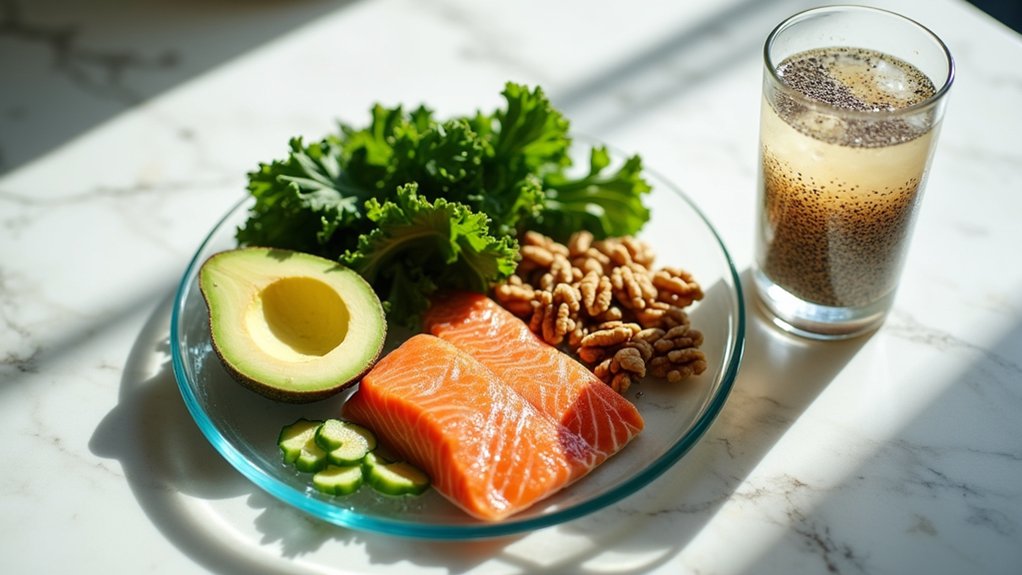Proper nutrition is essential for your recovery from cocaine use, as the drug depletes essential vitamins and minerals while disrupting your brain chemistry. You’ll need to focus on protein-rich foods to rebuild neurotransmitters, B-complex vitamins for nerve function, and omega-3 fatty acids for brain repair. Staying hydrated and maintaining electrolyte balance through water and nutrient-dense foods will support detoxification. Understanding specific nutrients and implementing dietary changes can greatly enhance your path to sustained sobriety.
Understanding Nutritional Deficiencies After Cocaine Use

When cocaine interferes with your body’s natural processes, it creates a cascade of nutritional deficiencies that can severely impact your recovery journey. The drug depletes essential vitamins and minerals while simultaneously suppressing your appetite, leading to poor eating habits and malnutrition. This double impact makes proper nutrition for brain recovery particularly important.
Cocaine use specifically diminishes your body’s stores of vitamin B complex, vitamin C, magnesium, and zinc, nutrients crucial for neurotransmitter production and brain healing. You’ll likely experience decreased protein levels, which affects muscle maintenance and cognitive function. The drug also disrupts your body’s ability to regulate blood sugar, leading to energy crashes and increased cravings. Understanding these deficiencies helps you target specific nutritional needs during recovery, allowing for more effective healing of both brain and body.
Essential Nutrients for Brain Chemistry Restoration
As your brain begins healing from cocaine use, specific nutrients play essential roles in restoring neurotransmitter balance and cognitive function. You’ll need adequate protein to rebuild neurotransmitters like dopamine and serotonin, which cocaine severely depletes. Focus on consuming lean meats, fish, eggs, and legumes.
B-complex vitamins support nerve function and help regulate mood, while omega-3 fatty acids reduce inflammation and promote brain cell repair. Magnesium and potassium are vital for electrolyte repletion after cocaine use, helping stabilize nerve signals and reduce anxiety. You can find these minerals in leafy greens, bananas, and nuts.
Vitamin C and zinc strengthen your immune system and aid in detoxification. Consider adding citrus fruits, berries, and pumpkin seeds to your daily diet to support your brain’s healing process.
Hydration and Electrolyte Balance in Recovery

Proper hydration works hand-in-hand with nutrient restoration during cocaine recovery. Your body needs adequate fluids to flush out toxins, regulate body temperature, and transport essential nutrients to healing tissues. During detox, you’ll need to increase your water intake to combat the dehydrating effects of cocaine use and support your kidneys’ natural cleansing processes.
Beyond water, you’ll need to maintain proper electrolyte balance. Cocaine use often depletes vital minerals like sodium, potassium, and magnesium. You can replenish these through sugar-free sports drinks, coconut water, or electrolyte supplements. Aim to drink 8-10 glasses of water daily, spacing them throughout the day rather than consuming large amounts at once. If your urine is pale yellow, you’re likely maintaining good hydration levels, which is essential for successful recovery.
Healing Foods and Dietary Recommendations
During cocaine recovery, your body requires specific nutrients to repair damage and restore ideal brain function. Focus on consuming lean proteins like fish, chicken, and legumes to rebuild neurotransmitters and support mood regulation. Include complex carbohydrates from whole grains and vegetables to stabilize blood sugar and reduce cravings.
Foods rich in omega-3 fatty acids, such as salmon, walnuts, and flaxseeds, help repair neural pathways and reduce inflammation. You’ll also benefit from antioxidant-rich fruits and vegetables that protect against oxidative stress. Dark leafy greens, berries, and citrus fruits provide essential vitamins and minerals needed for healing.
To optimize recovery, eat regular, balanced meals throughout the day. This helps maintain steady energy levels and prevents blood sugar crashes that can trigger cravings and mood swings.
Supplements and Vitamins to Support Sobriety

When recovering from cocaine use, specific supplements and vitamins can help restore depleted nutrients and support your body’s healing process. Your nervous system particularly needs B-complex vitamins, which cocaine depletes rapidly. Consider taking B12, B6, and folate supplements to aid in neurotransmitter production and brain recovery.
Omega-3 fatty acids, magnesium, and zinc are essential supplements for nervous system recovery. They help reduce inflammation, support brain function, and regulate mood. Vitamin C and D supplements can boost your immune system, while amino acid supplements like L-tyrosine and 5-HTP may help restore dopamine balance.
Always consult your healthcare provider before starting any supplement regimen, as they’ll determine the right dosages based on your specific needs and guarantee there are no interactions with other medications you’re taking.
Frequently Asked Questions
How Long Does It Take for Appetite to Return After Quitting Cocaine?
Your appetite typically begins returning within 2-5 days after quitting cocaine, though it can take 2-4 weeks to fully normalize. You’ll likely experience intense hunger as your body adjusts and seeks to replenish depleted nutrients. During this time, it’s essential you stay hydrated and eat regular, nutrient-dense meals even if you don’t feel hungry. Starting with small, frequent meals can help you ease back into healthy eating patterns.
Can Certain Foods Trigger Cocaine Cravings During Recovery?
Yes, certain foods can trigger cocaine cravings during recovery. You’ll want to avoid foods high in sugar and refined carbohydrates, as they can cause rapid blood sugar spikes and crashes that may intensify cravings. Caffeine and energy drinks can also trigger cravings since they’re stimulants. Instead, focus on eating balanced meals with lean proteins, complex carbohydrates, and healthy fats to help stabilize your blood sugar and mood.
Should Nutrition Changes Begin During Detox or After Withdrawal Symptoms Subside?
You’ll want to start making nutrition changes right during detox, as proper nourishment helps manage withdrawal symptoms and supports your body’s healing process. While you might experience decreased appetite initially, try consuming small, nutrient-dense meals and staying hydrated. Focus on easily digestible foods rich in B vitamins, amino acids, and minerals. Don’t wait until withdrawal subsides; early nutritional support can ease detox symptoms and strengthen your recovery foundation.
Are There Specific Meal Timing Recommendations for Recovering Cocaine Users?
You’ll want to eat small, frequent meals every 3-4 hours to stabilize blood sugar and reduce cravings. Start with breakfast within an hour of waking to jumpstart your metabolism. Plan your heaviest meal at lunch when your energy needs peak, and keep dinner lighter to support better sleep. Don’t skip meals, as this can trigger mood swings and increase relapse risk. Always carry healthy snacks to maintain steady energy levels.
How Does Coffee Consumption Affect Cocaine Recovery and Nutrient Absorption?
You’ll want to limit or avoid coffee during early cocaine recovery, as caffeine can trigger cravings and increase anxiety. Like cocaine, caffeine is a stimulant that affects dopamine levels and can interfere with your sleep restoration. It may also impair your absorption of iron and other essential nutrients. If you do drink coffee, keep it minimal and only in the morning hours to protect your sleep quality and nutrient uptake.






